Latvia, located in the Baltic region of Northern Europe, is officially referred to as the Republic of Latvia.
It is situated on the Baltic Sea between Estonia and Lithuania.
The country is known for its wide and stunning beaches and dense forests, abundant nature, and rich history.
But, for those considering making the move to Latvia, one might wonder: is it worth it?
As of 2021, 1.883 million residents call Latvia home.
The country is considered to be a first-world country with a high income and an advanced economy.
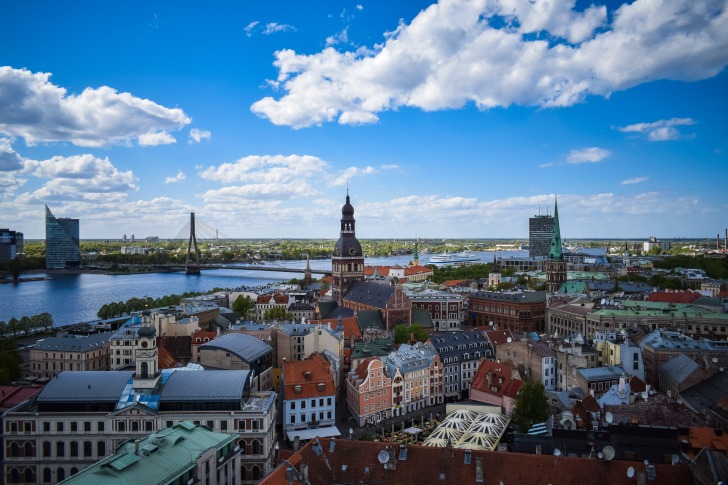
Contents
Pros of Living in Latvia
1. Latvia is part of the EU
Latvia forms part of the European Union.
This means that Latvian residents have freedom of movement within other countries that belong to the EU and that they can work in these member countries.
In addition, residents who would like to travel to other EU countries to study in those countries are free to do so.
Furthermore, residents are free to retire in any one of the other EU countries, if they choose to do so.
There are many other benefits enjoyed by participants of the EU, including the fact that workers may not work more than 48 hours in any seven days, or that workers are entitled to a minimum of four weeks of paid leave per annum.
Furthermore, EU members can rest assured that there are no GMOs in their food as their use has been banned in the EU since 2006.
These are just some of the benefits enjoyed by EU members.
2. Lower cost of living
The cost of living is relatively low in Latvia, provided that you earn a good income, or that you earn a foreign income, such as dollars or pounds.
The average family of four can get by on an income of approximately $2,500 without rent, and a single person can live on $750 without rent.
A meal at an inexpensive restaurant may cost you $10, a loaf of bread is just over $1, a pack of Malboro cigarettes works out to $4.50, and monthly utilities will cost you around $300.
Local childcare is much less expensive than international childcare.
For local childcare, you’re going to pay around $350, while international childcare is going to cost you $16,500 per month.
Earning foreign currency will allow you to benefit from the low cost of living in Latvia.
3. Seasons
Latvia is a country that experiences four distinct seasons.
The country is located in a temperate climate zone.
This means the country experiences mild to warm summers and cool to very cold winters with rain throughout the year.
Every season in Latvia is beautiful, rich, mesmerizing, and memorable.
Fall is a treat, especially when the leaves change color.
Spring brings a pop of color and summers are for making memories.
If you love experiencing the seasons, you’ll love what Latvia has to offer.
4. Natural beauty
Latvia is a country that brings exquisite architecture together with natural beauty, effortlessly.
The country has some of the most beautiful beaches in the world, with soft white sand.
Vast areas in the country of Latvia consist of beautiful lakes, rivers, pristine forests, and beautiful beaches.
The country is sparsely inhabited with most of the population concentrated around the capital city, Riga.
There are four national parks in Latvia for ex-pats and visitors to enjoy.
If you love fast expanses of natural beauty with sparsely populated spaces, then Latvia is the home that you have been looking for.
5. Unique architecture
A large section of the capital is constructed in Art Nouveau architecture.
This style of architecture is inspired by the natural world.
This style of architecture originally spanned from the 1890s to WWI.
The lines, curves, and style of the architecture are inspired by plants and other organic matter.
You’ll notice that the lines and curves have been flattened and lead seamlessly into the motifs.
Approximately a third of all buildings are made up of this architectural style, in the center of Riga.
This city has the highest concentration of this style of architecture in the world.
6. English is common
There is one official language that has two dialects: Latvian.
The more modern version is spoken in the west of the country, while Latgalian is spoken in the east.
Russian was one of the more common second languages in the country until 1991.
It was during this year that Latvia gained its formal independence.
English became the language of choice and also the most common foreign language.
Younger Latvians speak more fluent English than Russian.
Of course, your experience will depend on where in Latvia you are.
The closer you are to the capital and other major cities, the more English is spoken among the youth.
7. Tax
Latvia has a very progressive tax system.
There is a high degree of transparency in the tax system and the rates are relatively low.
This is especially beneficial for entrepreneurs as corporate tax is 15%.
This is one of the lowest tax rates in the EU. Their standard VAT is 21%.
The country has concluded various beneficial agreements to ensure that they do not double-tax citizens and residents.
8. Good schooling
Latvia is part of the Bologna Process.
What this means is that the education system in Latvia is world-class.
If you plan to move here and you have kids, this is without a doubt one of the primary benefits for your family.
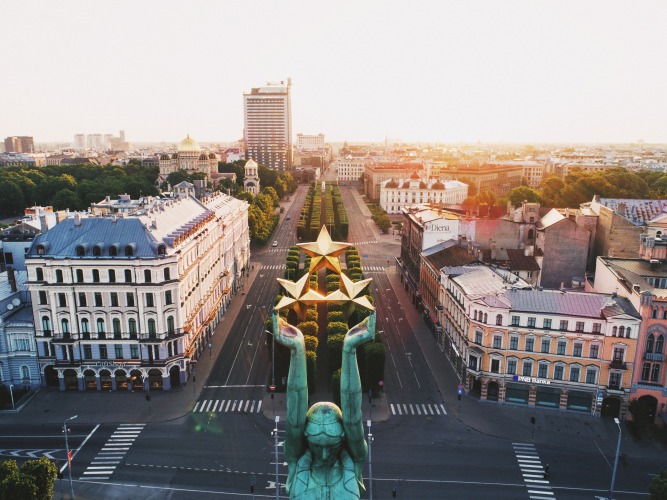
Cons of Living in Latvia
1. Limited job opportunities
The labor market has fluctuated over the past two years since the Covid outbreak.
Before the pandemic, more than half of the population in Latvia was actively contributing to the economy, around 62% to be exact.
Most of the economically active population was located in the capital city of Riga.
Covid-19 spread rapidly across the globe, including Latvia.
Economic activity was brought to a screeching halt.
Since the onset of the pandemic, the labor market has fluctuated due to ongoing outbreaks of the virus.
In March 2021, the market experienced a slight improvement but fell again by almost 1.7%.
Today, the jobs that are in high demand are vocational jobs.
Still, just under half the population is unemployed or not economically active.
2. Low-paying salaries
Many jobs don’t pay that well in Latvia.
The average salary in the country is approximately 500 Euros per month or $530.35.
The result of this is that many young graduates in Latvia travel to other EU countries in search of work.
Valuable, skilled labor is leaving the country and causing a major problem for the economy.
If you plan to move to Latvia and to benefit from the low cost of living, you will need to earn foreign currency, like dollars or pounds.
Most ex-pats that moved to Latvia already had a job with an international company and are earning foreign currency.
3. Outdated infrastructure
The government needs to invest money in the frail infrastructure of Latvia.
Over the past decade, there has been a slow and steady decline due to a lack of investment, poor economic growth, and the onset of a pandemic.
Several other sectors in the country have seen rapid growth in the same period, but the transportation sector has not grown and the infrastructure has not been updated with these sectors and therefore cannot accommodate this sudden growth.
Though the country has set a new goal to update the infrastructure, not just in the transportation industry, but also in all relevant industries of the country included.
The government is determined to raise the standard of living for all residents, reduce the country’s carbon footprint, and drive the country into digital transformation.
4. Cold winters
Many people prefer summer and living in regions where summers are long and winters are shorter and milder.
If this is you, then Latvia may not be the ideal destination for you.
Latvia has a temperate oceanic climate.
This means that summers are mild and pleasant, but winters are long, cold, wet, dark, and gray.
Temperatures during the winter fluctuate between 22 degrees Fahrenheit to -22 degrees Fahrenheit.
There are approximately four to five hours of sun during the winter.
There’s a difference between coastal and continental winters, but both get rain and snow.
5. Road infrastructure
The country has a problem with potholes and the more you move into the countryside, the worse the problem gets.
These potholes act like a domino effect that creates other problems.
For example, they cause damage to cars.
Owners need to pay more money for car repairs.
Increased use of gas contributes to emissions.
Drivers opt to take alternative routes, often longer, to avoid potholes.
In addition, there have been several car accidents as a result of this problem.
6. Entertainment
For young ex-pats, there doesn’t seem to be much in the way of entertainment.
Take the capital, for example, there are not a lot of restaurants or cafes where people can sit down, meet up with friends, or just relax.
This may be challenging to process as much of Europe has a cafe culture where locals meet and engage with each other.
Clubbing, on the other hand, is a different story.
There are plenty of nightclubs and Latvia is considered a hot party destination by many eastern Europeans.
7. Crime
When it comes to crime, Latvia does experience its fair share.
Organized crime is the biggest challenge faced by Latvia.
Petty theft and pickpocketing do occur in areas where there are a lot of tourists.
Other forms of crime include motor vehicle theft and large-scale corruption.
Human and drug trafficking in and through the country is another cause for concern.
8. The big divide
The country faces high levels of inequality as well as high levels of income inequality and poverty.
However, there are active steps to address this.
There is approximately 16% of the population living in poverty and the majority of these people are older.
There is also poverty among working adults as employment benefits are reduced after six months and eliminated after nine.
Unemployment is widespread in the east of the country where residents have poor access to good healthcare, housing, and food.
Pros and Cons of Living in Latvia – Summary Table
| Pros of Living in Latvia | Cons of Living in Latvia |
|---|---|
| 1. Latvia is part of the EU | 1. Limited job opportunities |
| 2. Lower cost of living | 2. Low-paying salaries |
| 3. Seasons | 3. Outdated infrastructure |
| 4. Natural beauty | 4. Cold winters |
| 5. Unique architecture | 5. Road infrastructure |
| 6. English is common | 6. Entertainment |
| 7. Tax | 7. Crime |
| 8. Good schooling | 8. The big divide |
Latvia Safety Overview
READ THE FULL REPORT: Latvia Safety Review
Safety Index:
- OVERALL RISK: LOW
- TRANSPORT & TAXIS RISK: HIGH
- PICKPOCKETS RISK: LOW
- NATURAL DISASTERS RISK: LOW
- MUGGING RISK: LOW
- TERRORISM RISK: LOW
- SCAMS RISK: MEDIUM
- WOMEN TRAVELERS RISK: LOW
Frequently Asked Questions
What is the main dish in Latvia?
The national dish, translated, is called gray peas with bacon.
It’s a stew dish served with fried onions, bacon, and speck.
What is the main tourist attraction?
The capital city, Riga.
Is there crime in Latvia?
Crime is relatively low with pickpocketing and theft being the major form of crime.
What is the religion in Latvia?
Christianity.
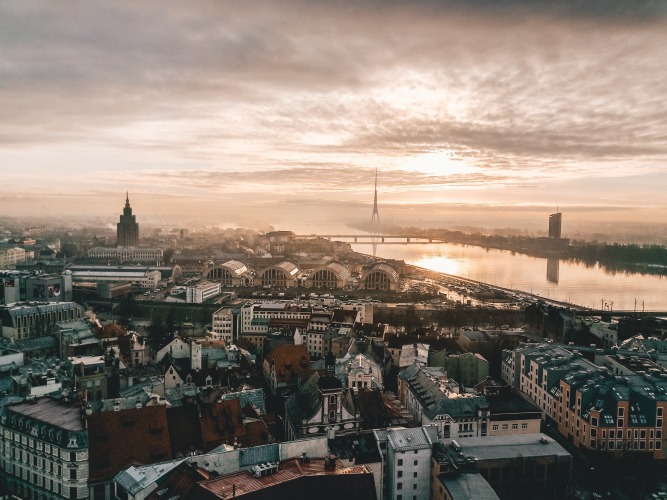


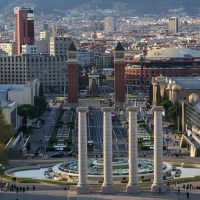
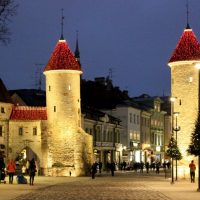
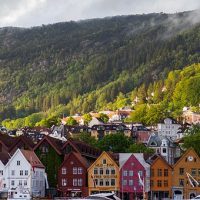
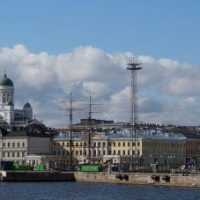





Latvian religion is Lutheran. But In Latvia there are also religions like Catholicism, Christianity, Bobtism